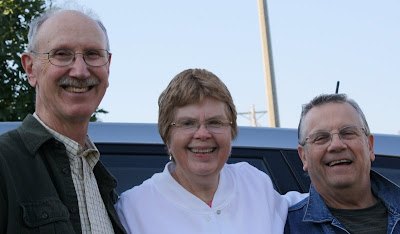 We have driven past them many times whenever we'd travel westward along I-94, but I never thought a lot about them except that I told my wife that these hills reminded me of something closely akin to what the 7th Cavalry thought. As a point of reference they are near the community of Glen Ullin.
We have driven past them many times whenever we'd travel westward along I-94, but I never thought a lot about them except that I told my wife that these hills reminded me of something closely akin to what the 7th Cavalry thought. As a point of reference they are near the community of Glen Ullin.Mark Kellogg, a reporter for the Bismarck Tribune, accompanied the march,who, by the way, died a few days later with Custer. He wrote of this site: "Yonder, in the southwest, at a distance of perhaps twenty miles, are to be seen, rising as if from the ocean, two symmetrical buttes shaped exactly alike,and resembling a pair of graceful cups inverted. They stand alone upon what otherwise would be an unbroken sea of living green verdure, decked throughout by beds of wild flowers. Our Indian guide observed that our attention has been attracted to his pair of beautiful hillocks, but, Indian-like, will not volunteer to gratify our curiosity until asked to do so. To our inquiry as to the name of the two buttes, he replied, 'Maiden's Breasts.' There were many hilarious remarks passed among the soldiers as they viewed these two hillocks."
The narrative of the book describes the trip as being arduous with a lot of misery, suffered by men and animals alike. About 150 infantry marched with the column, on foot of course as infantry would be expected to do as defense for the large number of supply wagons. But another group of about 75 also marched on foot, even though they were cavalry. There were not enough mounts at the fort for them to ride. Apparently the requisition for them had not yet been filled before they left the fort. So they marched in their riding boots, high-heeled, pointy toes, unsuitable for walking. Blisters, swollen feet, back aches, etc. made them miserable.













